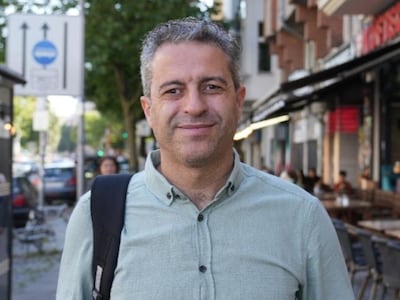Live updates: Follow the latest on the Syrian rebel advance
“I am not a refugee any more. I am just a Syrian,” said an ecstatic Sarah Hunaidi, who as a teenager in 2014 fled her hometown of Suwayda in southern Syria during the country's civil war.
Like millions of displaced Syrians around the world, she stayed awake all night watching the dramatic collapse of Bashar Al Assad’s regime. The stunning turn of events saw rebel forces sweep through Syria, conquering city after city, until Damascus fell over the weekend. Mr Al Assad fled the country, and the rebels declared Syria free.
“I can finally go back home,” Ms Hunaidi, now a Harvard University graduate, told The National. "So many years have been lost in exile. But I am a free Syrian now."
For millions of Syrians, this moment represents a mix of joy, relief and apprehension.
“I spoke to my mother and brothers who are still in Syria and we cried a lot,” said Ms Hunaidi, who was forced to flee the country after her social media posts made her a regime target. “I was just a teenager inspired by the Arab Spring. I was not a threat to anyone.
“My friends, who were just 16 or 17, got arrested and were tortured. Some had their nails pulled out, others were burnt with cigarettes or beaten with iron rods.”

After she and her family received threats from the regime, Ms Hunaidi knew she was not safe any more, she said. She escaped to Lebanon, then moved to Turkey and later to the US to study.
A decade later and thousands of miles away from Syria, the trauma of displacement haunts her.
While the fall of Mr Al Assad marks a new chapter, Syrian refugees know the road ahead will be long and fraught, with challenges for their nation. Yet, for the first time in more than a decade, they say they feel they are no longer defined by exile but by a new hope.
A nation shattered by war
Syria’s civil war, which began in 2011 as part of the Arab Spring protests, spiralled into one of the worst humanitarian crises of the 21st century. The Assad regime’s brutal crackdowns left more than half a million dead and displaced more than 12 million people, forcing nearly half of Syria’s population to flee their homes.
Cities were reduced to rubble, and the regime’s forces were accused of war crimes, including chemical attacks, mass torture, and indiscriminate bombing of civilians.
As Syria descended into chaos and violence, a mass exodus of people began. Syrians risked everything to cross seas and borders in search of safety. Many drowned in the Mediterranean, while others endured hostility, political apathy, and xenophobia in host countries.
The Syrian refugee crisis not only uprooted millions but also altered global politics. More than five million Syrians sought refuge in neighbouring countries like Turkey, Lebanon and Jordan, while others braved perilous journeys to Europe. The influx of refugees spurred the rise of xenophobic political movements and anti-immigrant policies in many European nations, reshaping attitudes towards migration.
According to the European Commission’s 2024 humanitarian overview, Syria remains in dire straits, with 16.7 million people still in of need humanitarian assistance.
But despite all the challenges, Syrians feel a glimmer of hope as the Assad regime comes to an end.
Amira Hassan, a Syrian mother of three who fled to Germany in 2016, told The National she wept “tears of joy" watching the regime’s collapse.

"That man [Assad] destroyed so many lives. I am happy that the blood of so many people, including my family, has not gone to waste.”
She said several of her extended family died trying to reach Europe and she has lost touch with others.
“I don’t know whether they are alive or not. At least now I want my children to have a normal life and go back home someday. Nobody wants to live as a refugee,” said Ms Hassan.
Joy, relief and cautious optimism
For Jihan Amin, a human rights lawyer in Damascus, the moment is historic. "Political prisoners have walked free from the notorious Adra prison. Some girls we know were sent there when they were just 15. Now, they are free,” said Amin.
“The whole nation is celebrating. In Damascus, Homs, and Hama, people are out in the streets, firing into the air."
However, not all feel unrestrained optimism. Kamira Sadoun, a Syrian who fled to the Netherlands in 2014, expressed reservations. “Why did we allow so much blood to flow in the streets? This liberation could have happened 14 years ago.”
Mr Sadoun, whose family remains in Syria, said he is cautiously optimistic about the rebel forces’ leadership. “The next phase may be as bloody as the last. My hope is for a Syria that is home to all its people.”
For Syrian Kurds, the moment is bittersweet. Hisham Arafat, a journalist from Qamishli who is waiting for asylum in the Netherlands, said his joy is “immense”.
“While the end of Assad’s rule brings hope, many of our Kurdish cities remain under Turkish occupation. The so-called opposition often treated us as infidels. My dream is for a Syria free of tyranny and extremism, where all its people – regardless of ethnicity – can coexist,” he told The National.
"For years, we’ve held on to a dream of returning home. Now, I hope we can rebuild a Syria where our children can grow up without fear."
While there is anxiety about the post-Assad administration, the refugees said they hoped Syrians had learnt the bitter lessons of the past.
“My hope is for a free, secular Syria where everyone is accepted despite their differences," said Ms Hunaidi. "We have endured enough.”


